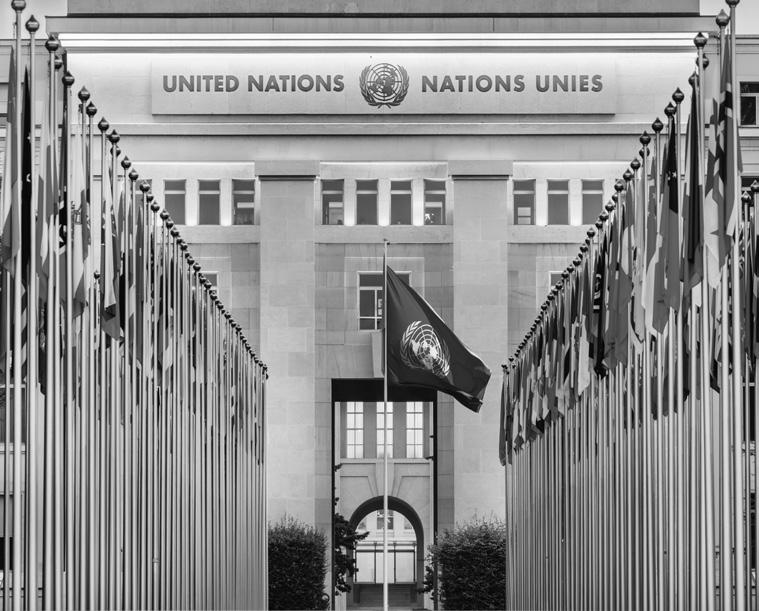
A BIBLICAL VIEW ON




Kerby Anderson

Globalism is the belief that one country cannot be separated from another and that global problems require global cooperation. For decades a small but growing group of internationalists have been working to bring various aspects of our society under one universal system.
Globalism is also the belief that government policies should be planned on a global basis and not based merely on the needs and interests of individual countries. Thus, there is usually an emphasis on unrestricted free trade and open borders.
In the past, globalist ideas have been promoted through the League of Nations or more recently under the United Nations. The goal has been to coordinate the actions of nation-states into a unified system. The forums for these discussions have been UN-related events that have often focused on climate change.
Associated with that has been the global influence of the World Health Organization. The pandemic and subsequent lockdowns il-
lustrate how these WHO policies have then been implemented in countries. Barack Obama’s former chief of staff, Rohm Emanuel, is known for saying “You never want a serious crisis to go to waste.” Globalists have said that the pandemic provided a great opportunity to implement many of their desired policies.
There have also been attempts to gather smaller groups of nations for meetings. The G7 meetings involving the U.S., Canada, Japan, Germany, France, Britain, and Italy are one example. The leaders meet annually to discuss issues such as global economic governance and international security.
One key term of globalism is the term “new world order.” That term has been used by presidents, the media, and think tanks to signal a change towards a global perspec-
tive. That idea has been promoted by the Club of Rome, the Council for Foreign Relations, and the Trilateral Commission.
The one group getting much of the attention today is the World Economic Forum founded by Klaus Schwab that is discussed in more detail in the booklet, A Biblical View on the Great Reset. He first introduced the concept of “stakeholder capitalism.” This is a term frequently used by progressives to reset the management goals in corporations from shareholders to stakeholders.
In Klaus Schwab’s book on stakeholder capitalism, he criticized capitalism as selfish and unsustainable. Instead, he proposes a “society, economy, and international community that is designed to care for all people and the entire planet.”
He is also known for writing about the Great Reset, which has two main components. The first is a call for huge new government social, economic, and welfare spending programs. The second is to have countries and companies implement environmental, social, and governance (ESG) metrics. This aspect of the stakeholder-capitalism model has been quite successful. The best estimate is that thousands of companies (including 82 percent of large U.S. companies) and more than fifty countries have ESG systems in place.
These various globalist platforms may have different agendas, but they seem unified in many of their goals. Critics rightly point to two concerns: the loss of privacy and the loss of property. Countries and corporations gather massive amounts of data on us and can
use that for surveillance or marketing. One of the best examples of a surveillance state is China which has deployed more than 500 million cameras. They also track the social media accounts and phone activity of their citizens.
The U.S. government has been developing the same capability. Critics (both liberal and conservative) have expressed their concern of a government that must oversee a vast surveillance state while also supposedly protecting human rights.
One article published on the World Economic Forum website had the title “I Own Nothing, Have No Privacy, and Life Has Never Been Better.” The author was attempting to describe the world of a fictional citizen living in 2030 where people do things differently. Private ownership of homes and cars are a
thing of the past. No need to own a house when you can rent. No need to own a car when you can use public transportation or even have a self-driving car pick you up.
Who owns everything? That would be massive corporations and wealthy individuals. BlackRock, for example, has over $10 trillion in assets under management, making it the world’s largest asset manager. People are often shocked to find out that in 2021, Bill Gates became the largest single private owner of American farmland.
Let’s first make a distinction between globalism and globalization. The former is our focus, but it is often conflated with the globalization. We obviously live in a global economy and are the beneficiaries of products manufactured
in other countries and sold in our country. There are obvious concerns about jobs that have been moved overseas where labor is cheap and governmental regulations are few. That is a topic for another booklet.
Our focus here is the growing concern that a group of powerful elites are making key decisions on a global basis without any political checks and balances. They control economic markets and collect massive amounts of data about us that can be used in surveillance. Even people who do not have a Christian perspective have deep concerns about a globalist agenda.
In a sense, globalism goes all the way back to the Tower of Babel (Genesis 11:1-9) in which the “whole earth had one language.” God confused the languages and dispersed the people. God estab-
lished nations and government. Dictators, military leaders, and internationalists have tried for centuries to return to a globalist world order.
We see that God created the nation of Israel in the Old Testament. Paul teaches in the New Testament (Acts 17:26) that God “made from one man every nation of mankind to live on all the face of the earth, having determined allotted periods and the boundaries of their dwelling place.” God intended that nations with borders and boundaries should exist.
Paul also teaches us that civil government is necessary and divinely ordained by God (Romans 13:1–7). Because government is a divinely ordained institution, Christians have a responsibility to work within governmental structures to bring about change. Christians
are to obey governmental authorities (Romans 13:1–4, 1 Peter 2:13-14). Christians are also to be the salt of the earth and the light of the world (Matthew 5:13–16) amid the political context. These teachings about boundaries and government contradict the globalist vision for a one-world government and a one-world economic system.
Many Christians also see what is unfolding on the horizon and believe it may be a fulfillment of the prophecies found in the book of Revelation. John receives a vision and sees the beast (also identified in other passages as the Antichrist) as having seven heads and ten horns (Revelation 13:1). This matches Daniel’s vision (Daniel 7:16–24) of a world governance system implemented by the Antichrist. He will “wage war against God’s holy people” and then conquer
them (Revelation 13:7).
Once he has control of these nations, the Antichrist will establish absolute control. Everyone will be forced to receive some type of mark “on their right hands or on their foreheads” to buy and sell (Revelation 13:16). Although there is great speculation about what that mark might be, we can at least agree that we have the technology today to make that happen in our current world economy.
There are many reasons Christians should be concerned about the push toward globalism. Here are a few areas of concern.
First, globalist ideas are being promoted in education. Students are being taught that we only have a few years left before we face an environmental apocalypse.
Schools are promoting concepts like “sustainable development” that sounds good but will radically change our society and lifestyles. We should pay attention to global education in the schools.
One globalist speaking to educators said “Every child in America who enters schools at the age of five is mentally ill, because he comes to school with allegiance towards our elected officials, toward our founding fathers, toward our institutions, toward the preservation of this form of government.” Their solution is to purge these nationalistic beliefs from school children so they will embrace the goals of globalism.
Second, these globalist ideas challenge the family. Many of the UN conferences and other policy groups talk about redefining the family, and see the traditional fam-
ily as an obstacle to their stated goals. Not only are families seen as a problem, so is population growth. How ironic that at a time when the fertility rate is dropping in developing countries, the globalist goal is to reduce population size even more.
Third, global elites often see the church as another obstacle. We hear less about this today because the church is dwindling in most European countries and is often a non-issue in many other countries around the world. But in places where the church is strong, it poses a problem because of its belief in the authority of the Bible. Christians believe in sin, salvation, and faith in Jesus Christ alone. That stands in the way of a united one-world government and an ecumenical one-world religion.
Jesus taught that “I am the way, August 2024 13
the truth, and the life. No one comes to the Father but through Me” (John 14:6). Globalists see orthodox Christianity as narrow, exclusive, and intolerant. One globalist went so far as to say “Any child who believes in God is mentally ill.”
First, educate yourself and others. We need to be informed about the push toward globalism and need to share that with others. You need to also find out if globalist ideas are being taught in your school district.
Second, express your concern to educators and your elected officials. They may not be aware of the insidious nature of what is being promoted in schools and city councils. Educate them about the dangers of globalism and the threat to the foundations upon
which your community rests.
Third, pray for those in government. We are admonished in 1 Timothy 2 to pray for our leaders. We should pray they have discernment and are not led astray by the designs of the globalists. We should not elect to office individuals who are willing to give away our national sovereignty, and we should support those who take a bold stand for our country and its interests.
Kerby Anderson, A Biblical View on The Great Reset, Dallas: Point of View Ministries, 2022.
Seamus Bruner, Controligarchs, NY: Sentinel, 2023.
Glenn Beck, Dark Future: Uncovering the Great Reset’s Terrifying Next Phase, NY: Forefront Books, 2023.
Glenn Beck, The Great Reset, NY: Forefront Books, 2022
Mark Hitchcock and Jeff Kinley, Global Reset: Do Current Events Point to the Antichrist and His Worldwide Empire?, Nashville: Thomas Nelson, 2022.
Carol Roth, You Will Own Nothing, NY: Broadside Books, 2023.

